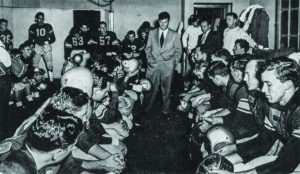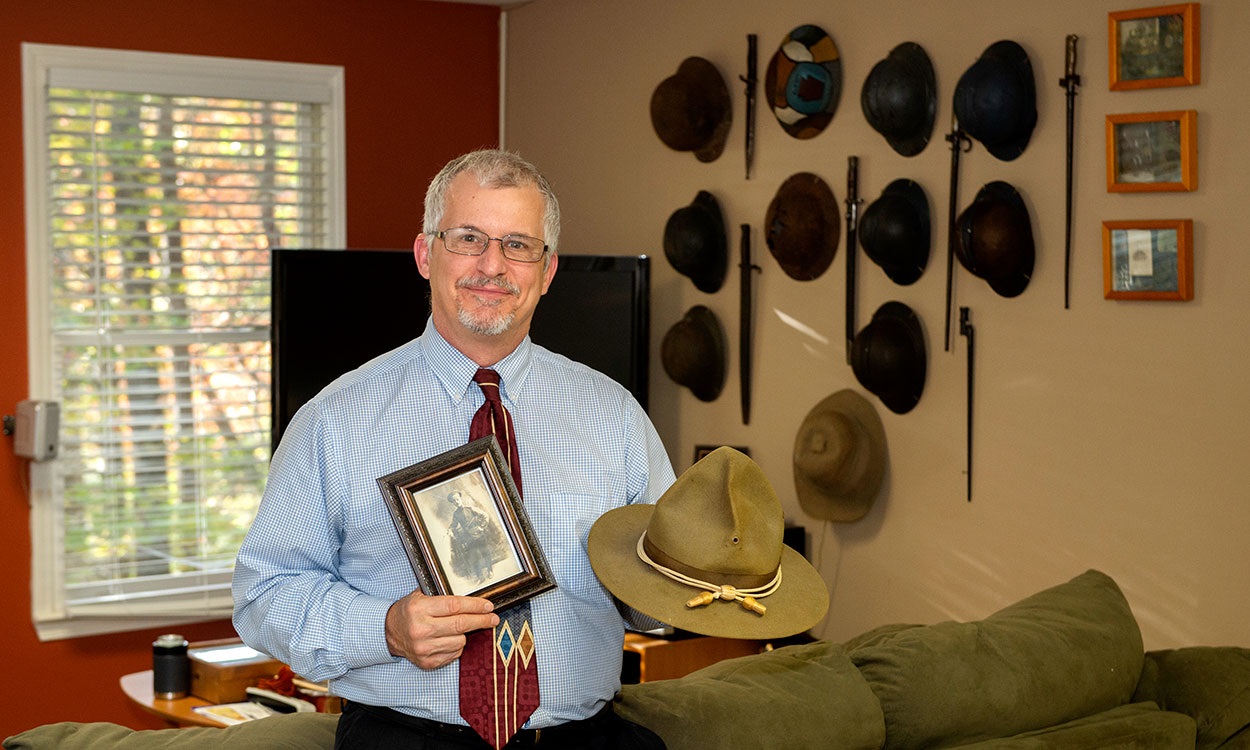In The Trenches
They were a little older, a little wiser and most liked to play poker. And with nicknames including Pee Wee, Buffalo and Pinball, you knew they were going to make something happen — and they did.
Welcome to the 1949 football team at Western Carolina Teachers College, which 70 years ago this fall won the North State Conference championship — the only championship a Catamount football team has ever won to date. The Cats swept their conference, finishing the season 7-2, losing to West Virginia’s West Liberty College, 20-0, in the first Smoky Mountain Bowl held in Bristol, Virginia, on Thanksgiving Day, 1949.
Led by numerous World War II veterans who had returned home and enrolled at WCTC, thanks to the GI Bill, the championship season was a redemption of sorts for a college whose administrators nearly canceled the program. They had suspended it during the 1942-44 seasons because of the country’s entry into World War II, said Steve White ’67, retired WCU sports information director, and were reluctant to bring it back because it had never won much, there was no coach and the playing field was in disrepair.
But in the fall of 1945, faculty members, administrators and local businessmen rallied WCTC President H.T. Hunter to reinstate football, declaring it would be good for the community. They made the case for a new stadium to be built in honor of former students and employees who had lost their lives during the war.
By the time the 1949 season arrived, the new Memorial Stadium was ready and Catamount football had found its feet, placing second in the conference with a 7-3 record the previous year behind the leadership of its World War II veterans and Coach Tom Young. The football field had become a new battleground of sorts, where these now-seasoned young men could put their well-honed leadership skills to work. Dan Robinson ’50, a senior tackle and a Navy veteran, was one.
“I think having the military experience gave me a lot of self confidence,” said Robinson, 93, of Cullowhee. “You felt like you probably could do things that you couldn’t do, and that was good as far as football.”
Robinson was a Navy gunner’s mate, keeping the anti-aircraft guns on his vessel trained on the sky on D-Day, while his boat hauled Canadian soldiers to Juno Beach, then converted to a floating hospital to care for the wounded.
Robinson enlisted on his 17th birthday, on July 17, 1943, much to his mother’s disapproval. She already had one son in the service. But he needed her signature. “She said, ‘Dan, you ought to wait a year. You think you’re a man, but you’re not. You’re a boy.’ And then she said, ‘Dan, I’d rather get a report that you were dead as to get one that you had been dishonorably discharged. You want me to sign the papers?’ And I said, ‘Sign the papers,’” Robinson said.
He spent 15 of his 33 months in the Navy moving wounded soldiers, prisoners and ammunition for Gen. George Patton, growing into the man his mother had wanted him to be and into a leader who would one day serve WCU as its football coach and the region as a state senator.
When the war ended, Robinson came home and enrolled at WCTC in the fall of 1946. He was 21. He also wanted to play football. It helped that a new football coach came calling. “Tom Young came down and talked with me,” Robinson said. “He gave me a scholarship. I had a scholarship and the GI Bill, so I had a little change in my pocket.”
Robinson remembers that while he and his fellow veterans acclimated to life as football players, some of their old military habits refused to die, much to the chagrin of their coach. “We were bad to play poker,” Robinson remembered. “And Coach Young absolutely did not want us playing poker. It drove him up the wall.”
Robinson wasn’t the only Navy man Young recruited. He also offered a scholarship to former Seaman First Class Boice Winchester ’50, from Brevard, who had played football at Brevard Junior College following his return from the Navy in 1946. Winchester had enlisted at age 18 and spent about two years stationed in Puerto Rico, patrolling the Panama Canal for German submarines.
 Winchester, 92, who lives in Florida, said he was a more mature student having served
in the Navy before attending college. He was almost 22 when he enrolled at WCTC. “Playing
football was great,” he said. “I met a lot of guys who had been in the service and
also played football.”
Winchester, 92, who lives in Florida, said he was a more mature student having served
in the Navy before attending college. He was almost 22 when he enrolled at WCTC. “Playing
football was great,” he said. “I met a lot of guys who had been in the service and
also played football.”
Winchester, who played half back, went on to earn a graduate degree in school administration from the College of William and Mary in 1961 and then spent about 22 years in Germany as an education administrator for the Department of Defense Dependents schools.
Bob Humphrey ’51, who lives in Franklin, Tennessee, also played on the 1949 team as a scholarship recruit, but he wasn’t a military man then. Humphrey had been a standout football player at Gardner-Webb University — he was inducted into that school’s Hall of Fame in 2000 — but he said he felt a bit inferior to the seasoned, hard-nosed players who had fought the Germans.
“They taught me to play rough and to go all out to win because that’s what they did during WWII, they were out to win the battle,” said Humphrey, 89, who played end.
After Humphrey graduated from WCTC, he joined the Air Force and spent four years, mostly in the states, in military transport service. Once out, he worked for General Motors Acceptance Corporation — the financial arm of GM — for about 42 years, retiring in 1997.
“I certainly appreciated those fellas, the veterans, and I wish that we could have stayed in touch,” Humphrey said. “There are a lot of times I think about them. It was a joy playing football with them.”
After Robinson graduated from WCTC, he coached high school football, then returned to his alma mater in 1956 to lead the Catamounts as their head coach for the next 13 years. “My record overall was so-so because we had the fewest scholarships in the league.”
Robinson said grouse hunting kept him alive during his stressful coaching tenure at WCU, an activity he had to stop because of his bad back. “When I got out there with that bird dog I didn’t have any stress,” he said. “I loved every minute of it.”
Robinson served as a Democratic member of the N.C. Senate from 1999 to 2002 representing District 29, helping to secure $98.4 million for WCU during Chancellor John W. Bardo’s tenure as part of a $3.1 billion bond issue.
Robinson lives with his wife of 57 years, Jean, near campus. He gets wistful thinking of his former teammates, most of whom have passed away. “Pee Wee Hamilton ’50 and I were roommates in graduate school. He was a whiz. He probably, pound for pound, was the best player on the field. Golly Moses, he was intelligent, he was courageous and he had skill. He had about a 250-pound blocking back in front of him who wasn’t afraid of the devil, Jack Arrington ’50. It was a good combination.”

